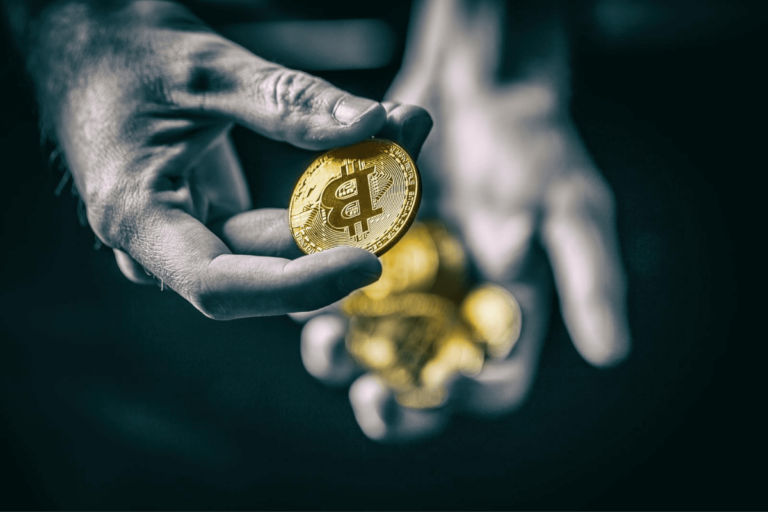What to Know Before Investing In Bitcoin

Where cryptocurrencies were once the reserve of tech nerds, these days, they’ve become so mainstream that your parents might be considering investing in cryptocurrency.
This news might strike excitement into the hearts of diehard crypto fans, but it also means there’s a rise in people who want to get in on the “hype” and invest in cryptocurrency without truly understanding how they work.
RELATED ARTICLE: 50 Stupid Simple Side Hustle Ideas (& How to Make Them Work)
1.They’re Based on Blockchain Technology
You don’t have to be an investor to have heard of blockchain technology. But would you be able to explain how it works? For most people, the answer to that question is no.
In a nutshell, blockchain is the infrastructure that supports cryptocurrencies. It’s also decentralized, therefore offering an alternative to the traditional, centralized financial institutions.
RELATED ARTICLE: 4 Dividend Stocks to Fight Inflation
Instead of middlemen like banks ensuring our current and savings accounts remain secure, the blockchain forms an anonymous but public digital ledger of buys and sells — made up of blocks in a chain.
Using sophisticated cryptographic protocols and incentive systems, the users themselves keep the infrastructure running without sacrificing security, anonymity, or efficiency. At least, that’s the theory.
If you’re thinking this sounds somewhat vague, that’s because the blockchain works differently for each cryptocurrency.
For instance, on Bitcoin, users “mine” new blocks: they search for the right cryptographic combination to verify a transaction, which helps to form the blockchain and results in a reward of Bitcoin for the “miners.”
In contrast, many other cryptocurrency systems use staking, which involves users placing their assets down to verify a transaction, with the possibility of receiving a portion of transaction fees.
2.You can Break Them up into Smaller Pieces
As you might have heard, in U.S dollar terms, many cryptocurrencies are worth a lot — even when the value of Bitcoin dropped significantly in 2019, it didn’t go below $3,000.
That’s not exactly very practical for buying a coffee or even a new phone. It’s also not useful for investors who’d prefer investing in cryptocurrency similarly to a fractional stock rather than a whole Bitcoin.
RELATED ARTICLE: How Financial Freedom is Possible on Almost Any Income
Fortunately, just like U.S dollars can be split into cents and British pounds can be divided into pennies, Bitcoin breaks down into units.
The smallest of these is a Satoshi (named after Bitcoin’s founder, Satoshi Nakamoto), worth 0.00000001 of one Bitcoin. A few other units, including the millibitcoins (0.001 of one Bitcoin) and microbitcoins (0.000001 of one Bitcoin).
Similar systems exist for other cryptocurrency options, too. So, despite the recent price gains in Bitcoin and others, ordinary folks are not ‘locked out’ and can still invest smaller amounts in the crypto market.
3.There’s a Limited Supply
For an asset to be valuable, it must be scarce — or at least difficult to obtain. That’s why oil is worth more than dirt. It’s also (one of the reasons) why the government can’t just print as much money as it wants and hand it out to citizens.
RELATED ARTICLE: 12 Reasons Why You Should Buy Silver
So, the makers of cryptocurrency had to recreate this feature in the digital world. If unlimited amounts of Bitcoin were available and ready for the taking, it would be hard to justify one single Bitcoin being worth thousands of U.S dollars.
The supply of Bitcoin is 21 million, with the number still available to mine decreasing each day. Some see this as a significant flaw in how the system works, so there’s speculation that more coins may have to be released.
Naturally, not every cryptocurrency works quite like Bitcoin. However, almost all of them have some kind of financial or technological mechanism to limit how many are available or make coins difficult to obtain.
4.Use Them Anonymously
When we deposit money into an account with a financial institution, the bank knows exactly who we are. The same isn’t true when you’re investing in cryptocurrency.
Let’s say you buy some ether from an exchange like Coinbase. You’ll then need to transfer that digital currency to a virtual wallet to store your investments (more on your options for this later).
The company that hosts the wallet has no idea who you are. Instead, you use two 16-digit passwords (a public key and a private key). The public key is for sending money to the right person, while the private key is for confirming the trade.
As our personal data is becoming more readily available to governments and a small number of corporations, this is becoming an increasingly important and popular perk.
5.Mass Adoption is Still Far Off
With investing in Bitcoin and other cryptocurrencies discussed so frequently, it can sometimes feel like we’re on the cusp of mass adoption, especially as major companies like Tesla are now accepting Bitcoin.
While interest is growing, in reality, we’re still a long way off. Mass adoption means many, many more people are buying cryptocurrency and using it in their everyday life.
When your grandparents give you your birthday present in the form of Bitcoin, that’s when we’ve reached mass adoption.
Related Articles From the Parent Portfolio Network:
- 4 “No Money” Ways to Invest In Real Estate
- 7 Ways to Invest in Real Estate Without Buying Property
- How I Acquired Three Investment Properties In 18 Months
This article is originally on Wealth of Geeks and was syndicated by Parent Portfolio.






